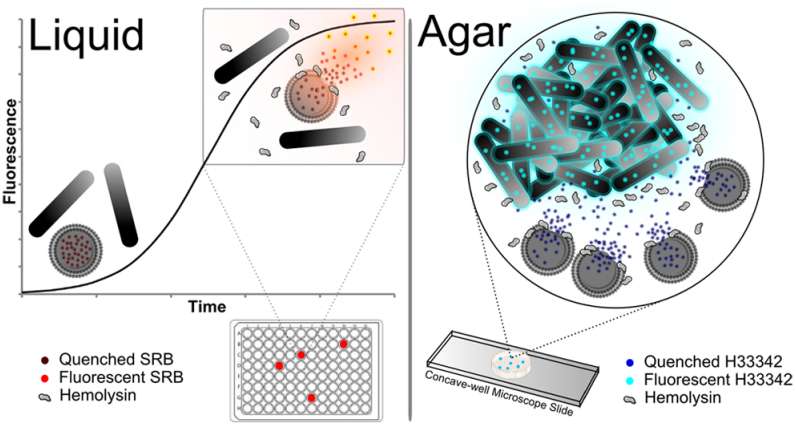Lipid vesicles replace blood in new bacteria test

As schools around the U.S. start back up, so do trips to the doctor's office. But is that raw sore throat due to bacteria, which can be fought off with antibiotics, or a virus? Getting a definitive diagnosis of bacterial infections like Strep throat can take days. Now, one group reports in ACS Sensors that they have developed a new test that will provide results in just hours.
Beta-hemolytic bacteria are those pathogens that are frequently to blame for illnesses that are spread among school children like Streptococcus, or those like Listeria that cause many foodborne illnesses. The current test was developed back in 1903 and involves streaking a patient sample onto blood agar plates. It works well, but it can take days to obtain results. The bacteria are placed on a "blood agar" plate. If they are beta-hemolytic bacteria, they will produce an enzyme that breaks down red blood cells. Clear zones form, which allows doctors to identify the type of bacteria. Some existing tests can detect a single type of beta-hemolytic bacteria but one has to know exactly what microbe to test for ahead of time. In an effort to monitor food safety and provide rapid diagnoses for patients, Ian Cheong and colleagues sought to develop a test that would provide results in hours.
The researchers used the original blood agar test as inspiration for their new one. In the new assay, they placed fluorophores inside liposomes, which are lipid vesicles that have been used for controlled drug release. While in the liposome, the fluorescent molecules are packed together and are quenched, or dark. But when in the presence of beta-hemolytic bacteria, the liposome is broken open, the molecules are released, and they fluoresce. The test, called BETA, distinguished beta-hemolytic bacteria from control bacteria with 100 percent accuracy in 6 hours on plates, and with 99 percent accuracy in liquid broth in an hour. The researchers say the method is rapid and cost-effective, which makes it ideal for diagnostics in developing countries.
More information: "Beta-hemolytic bacteria selectively trigger liposome lysis, enabling rapid and accurate pathogen detection", ACS Sensors, pubs.acs.org/doi/abs/10.1021/acssensors.7b00333
Provided by American Chemical Society


















